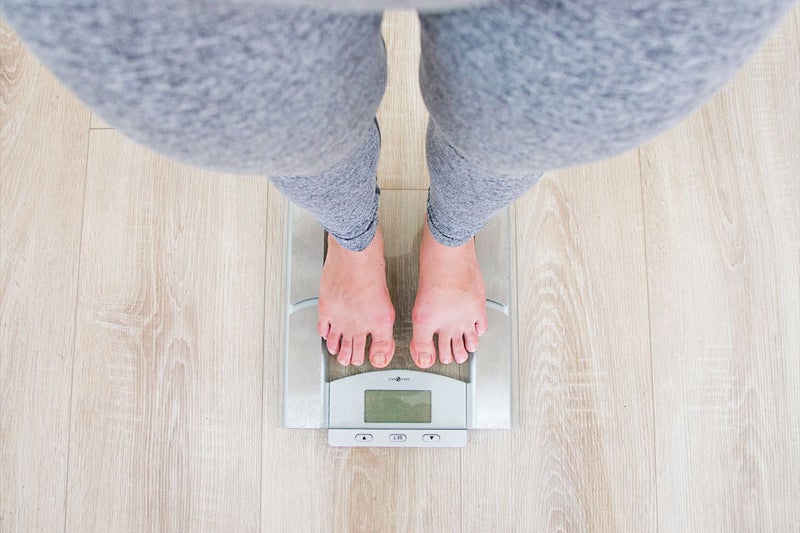Avoid excess weight gain
Having overweight or obesity can increase your cancer risk

Excess body fat (especially fat around the waist and vital organs) can increase the release of harmful chemicals and hormones into the body. It may also lead to inflammation. This environment makes it more likely that cells will start to divide abnormally, and that a cancer will grow.
However, not everyone living in a larger body is unhealthy, and not everyone living in a smaller body is healthy. Eating well and being physically active are behaviours that will reduce cancer risk, regardless of a person’s body weight. These behaviours are what we would recommend for individuals seeking to avoid weight gain, maintain a healthy weight or lose weight to reduce cancer risk.
Body weight and health risk
Since the 1980s there has been a steady increase in the number of Australians who have overweight or obesity. At least 67% of adults and 25% of children now have overweight or obesity.
Having overweight or obesity increases the risk of developing certain types of cancer, including common forms such as bowel and (post-menopausal) breast cancer, as well as cancers of the endometrium, kidney and oesophagus. It also increases the risk of some other common chronic diseases, like heart disease and type 2 diabetes.
Measuring health risk
It is very difficult to directly measure body fat, but BMI and waist circumference can give us an indication of it, and of our health risk. The simplest way to measure BMI for adults is to enter height and weight into an online BMI calculator like this one. A BMI under 18.5 or over 25 is associated with a higher risk of certain health issues. Waist circumference can also be used. A waist measurement of over 80 cm for women, and over 94 cm for men suggests a higher risk of chronic disease.
These are quick and easy tools to get an idea of our disease risk – but they don’t show us the whole picture, and aren’t appropriate for everyone. For example, Aboriginal and Torres Strait Islander peoples, or people with Pacific Island, South Asia or Chinese heritage, people over 65, some high performance athletes etc. These measurements are always best considered in consultation with a health professional, along with other risk factors including family history, blood pressure, diet and physical activity assessments. No matter our weight or shape, healthy behaviours like eating well and moving our bodies will have health benefits.
What could I do?
The causes of weight gain are complex, and are not always things we can control. Some of these factors include genetics, access to healthy foods and spaces that allow for physical activity, certain medicines and health conditions, and aggressive marketing of unhealthy foods and drinks by the ultra-processed food industry.
Research shows that weight-loss is challenging, and we know that many people have had the experience of losing weight and regaining it. We recommend concentrating on healthy habits that will reduce cancer risk. Some of these habits (like eating well and moving our bodies) can help avoid weight gain, maintain our weight or lose weight. It’s important to remember that eating nutritious food and moving our bodies has benefits, (even if they don’t lead to weight change).
Some tips to eat well
- Cook at home – we tend to cook with less sugar, saturated fat and salt and with more vegetables that restaurants and fast food outlets
- Make water our main drink
- Reach for fruit and vegies as snacks
Some tips to be active
- Find a physical activity that you find fun
- Book your exercise into your calendar to help prioritise it
- Move with a friend to help keep each other motivated
Nutrition and physical activity in the workplace
Poor nutrition and lack of physical activity increase your risk of developing certain cancers. Encouraging employees to be physically active and to eat healthy food is an important step toward reducing the risk of cancer in your workplace.
Some tips:
- Encourage people to ride or walk to work and to use the stairs.
- Provide bike sheds and showers.
- Include healthy options when catering.
- At social events and functions, make sure water is readily available and alcohol is served in moderation.
- Limit the number of vending machines.
- Walk to a colleague’s desk instead of phoning or emailing.
- Have standing or walking meetings.
- Stand at the back of the room during presentations.
- Use adjustable sit/stand desks to help employees reduce their sitting time.
Learn more about reducing your cancer risk with diet and exercise
